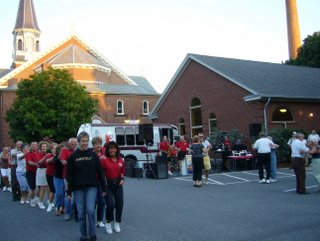So-called Polish-American Picnic

Yesterday was the annual Polish-American Picnic at St. Michael's Cathedral down the street from me. I decided to walk over this year and see what was up.
I've always thought it odd that St. Michael's would choose a Polish festival as a fundraiser, since it doesn't have a Polish heritage. But a few years ago they decided to capitalize on the large number of people of Polish descent in the area. "We're a multi-ethnic parish," the woman selling food tickets informed me.
The Eddie Forman band provided polka music, and Collegian Court, a pretty good restaurant, supplied the food. You bought tickets at $1.00 apiece and then traded them for individual items or a whole Polish plate. Since I'm a vegetarian, I only wanted pierogi--especially if they happened to be cabbage--and a cup of coffee.
I was in luck. Coffee was one ticket; cabbage pierogi, two. I got my food and sat down. Cousin Joanne, behind me, learned there were no more Polish plates...no kiełbasa...no gołumbki. She got the last order of pierogis. When our friend Helen arrived a few minutes later, she and her husband had to settle for hamburgers. What could we do with the leftover tickets, I wondered? I looked over at the food table and saw one of the servers eating the last piece of dessert.
St. Michael's might have thought that, by hiring a polka band and ordering food from a Polish restaurant, they had the bases covered. But they left out the essential ingredient of any Polish affair: abundance. Abundance is the essence of hospitality and festivity. The poorer you are, the more you heap it on for special occasions. And Polish people, historically, were pretty poor.
Almost the only memory I have of my Polish grandmother is of her pressing food on me. She, my mother, and my aunts were rarely out of the kitchen. When I'd walk into my Aunt Helen's house, she'd immediately reach for the plates. If I protested that I'd already eaten lunch, she'd say, "How many times?" My ex-husband used to say that if he had known what kind of family he was marrying into, he would've bought two dining room sets and put one in the living room, since we never got up from the table.
Joanne just could not get over the paucity of food. "Why couldn't they have had a pot of water boiling in the back, and just throw in some pierogi if they ran out?" she kept asking. "How hard would it have been to heat up some extra kiełbasa? The soup kitchen is right next door...they could've taken the leftovers there. Or fed people after Mass on Sunday."
Lucky for us that we come from a family that thinks nothing of sitting down to the same meal twice. When Joanne dropped over to pick me up for the picnic, the first thing I had done was to feed her supper anyway. And when we got back to my house afterwards, we sat in the kitchen and I put the tea on and hauled out some goodies. I can't help it...I'm a Polack.


